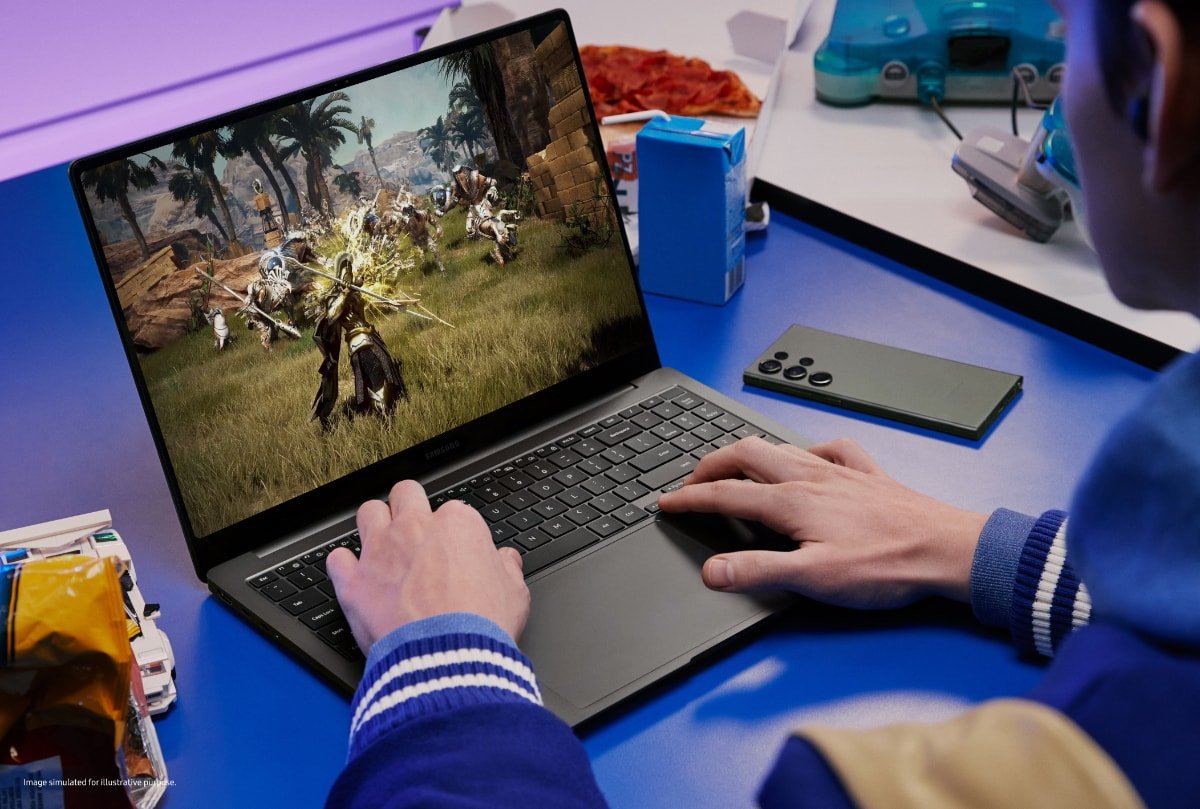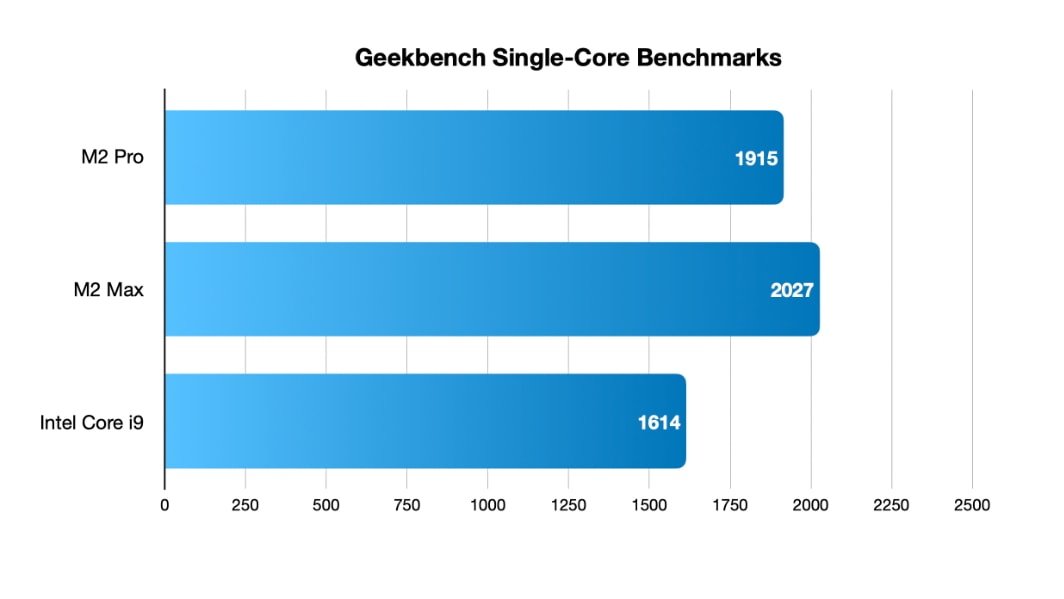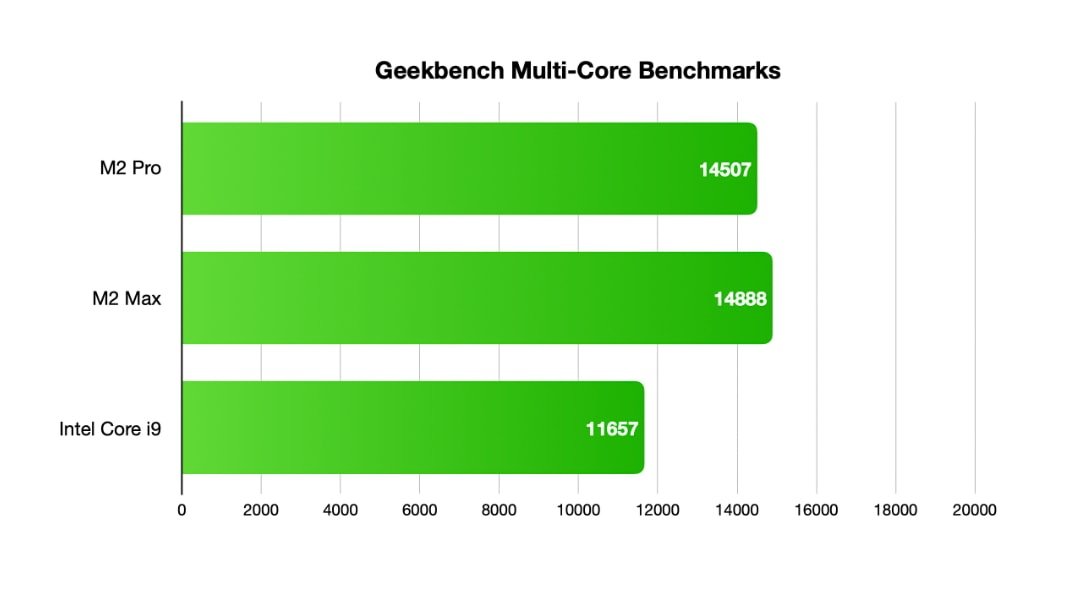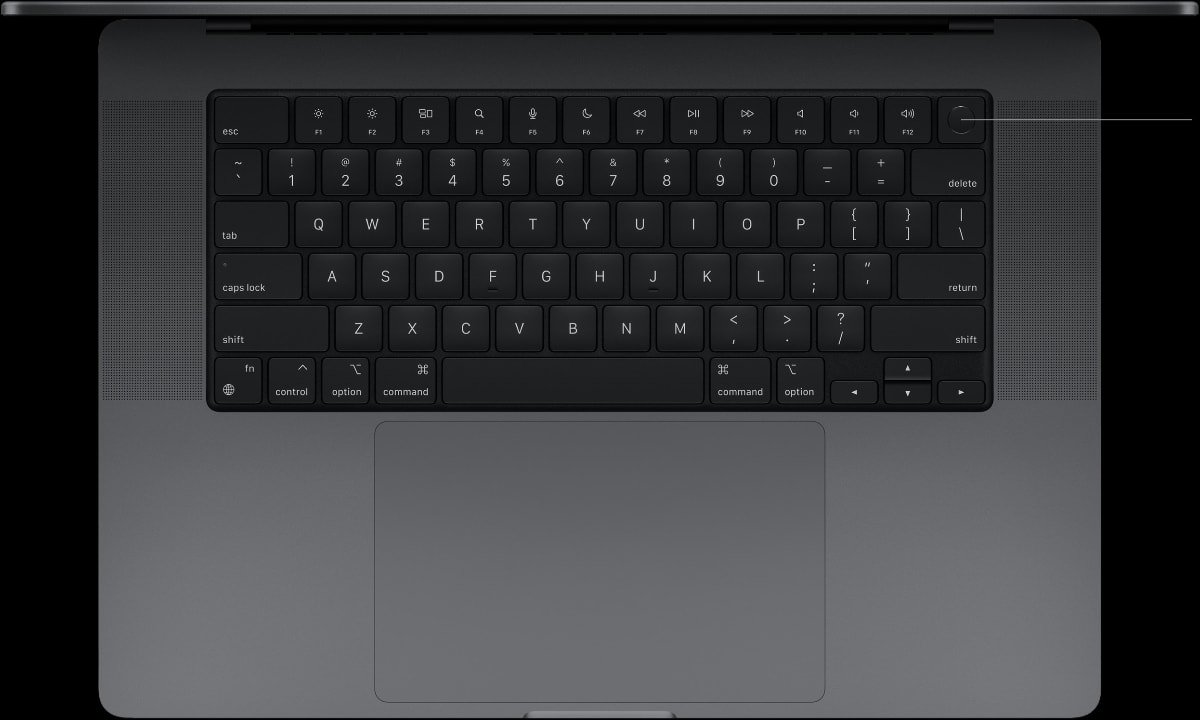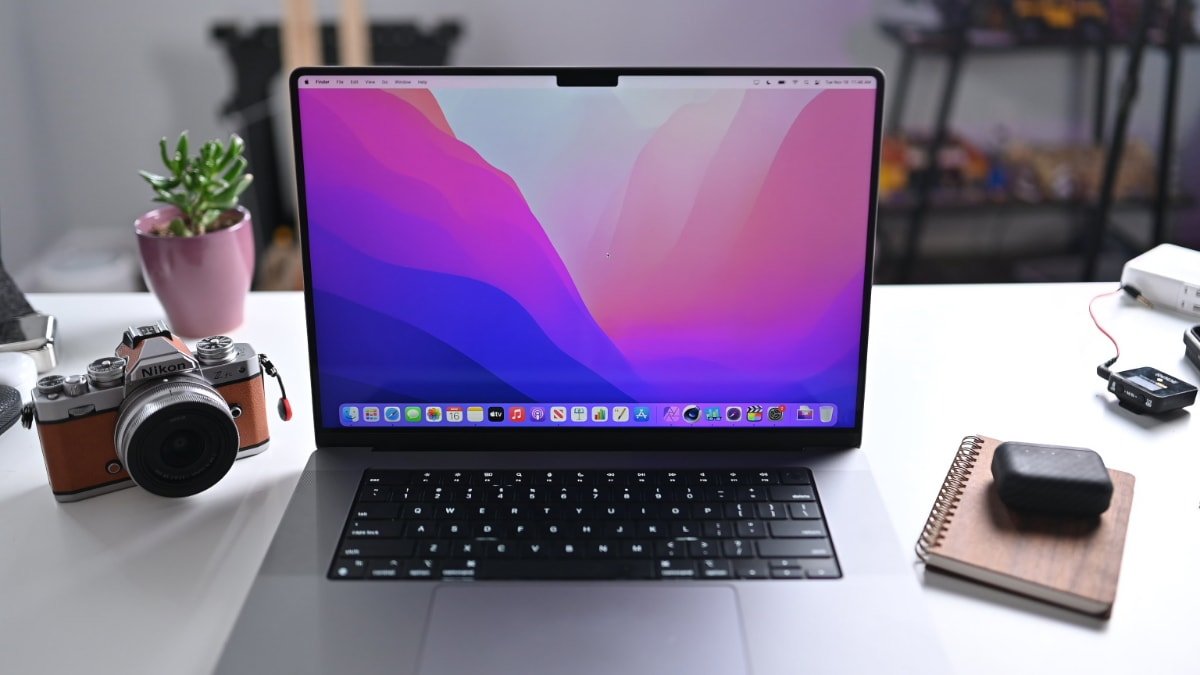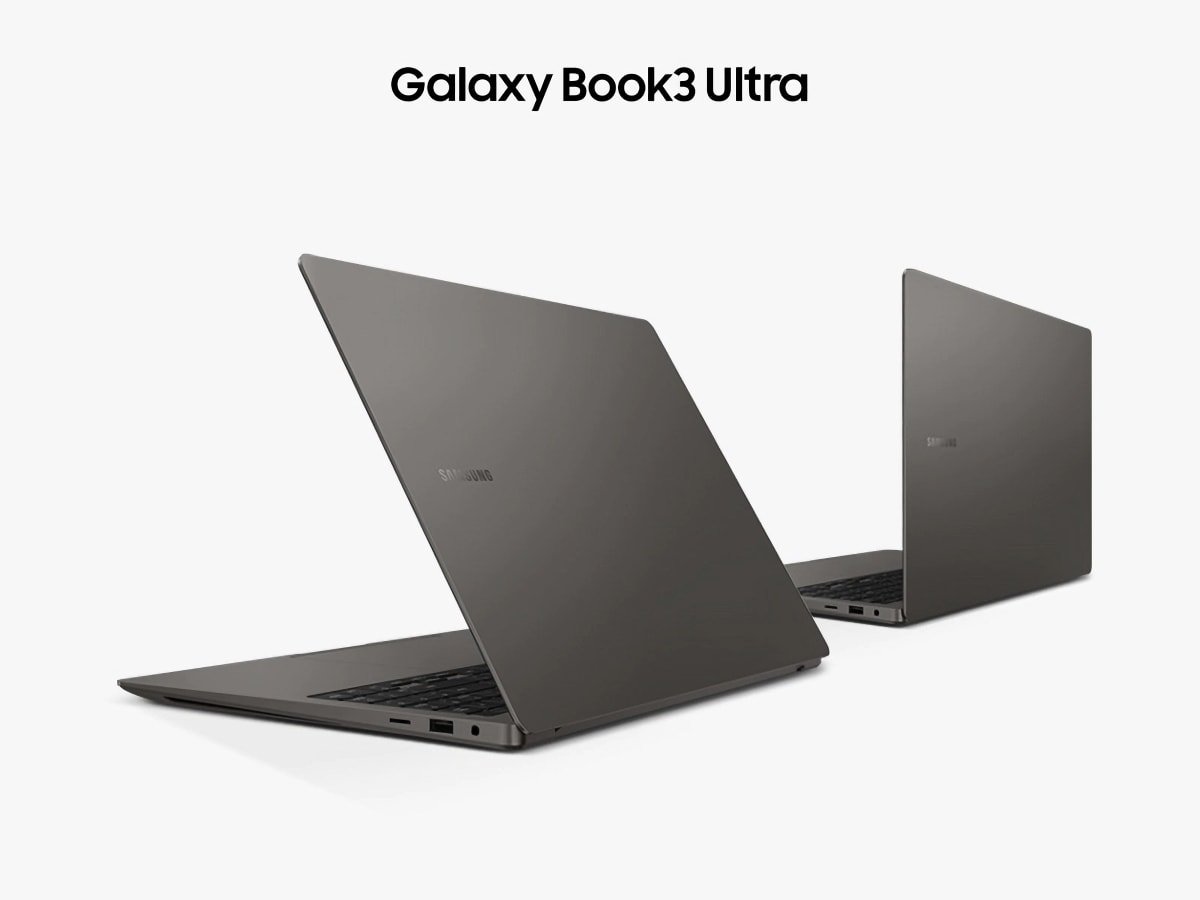
Samsung Galaxy Book 3 Ultra vs MacBook Pro 16-inch - compared
Samsung recently announced the Galaxy Book 3 line of notebooks, which offers high performance for gaming, productivity, and more. Here’s how the Galaxy Book 3 Ultra compares against the 16-inch MacBook Pro.
Announced on February 1 and shipping on February 17, the Galaxy Book 3 Ultra is Samsung’s answer to the MacBook Pro from Apple. It’s a 16-inch notebook with some of the latest technologies, such as a 13th-generation Intel processor and an NVIDIA GeForce RTX 4050 graphics card.
Samsung unveiled the new notebook at its Unpacked event, along with other devices. Three distinct variants — the Galaxy Book 3 Ultra, Book3 Pro 360, and Book3 Pro — make up the Galaxy Book 3 notebook line.
The top-tier, most expensive device in the new portfolio is the Galaxy Book 3 Ultra. Here is how it contrasts with Apple’s 16-inch MacBook Pro, which was unveiled in January, and the target market that Samsung is most likely pursuing with its offering.
Galaxy Book 3 Ultra vs MacBook Pro 16-inch – Specifications
| Specifications | Galaxy Book 3 Ultra | MacBook Pro 16-inch |
|---|---|---|
| Price (starting) | $2,199.00 On sale at Samsung |
$2,499.00 Best 16-inch MacBook Pro price |
| Display size (inches) | 16.0 | 16.2 |
| Dimensions (inches) | 0.65 x 13.99 x 9.86 | 0.66 x 14.01 x 9.77 |
| Weight (pounds) | 3.95 | 4.7 (M2 Pro), 4.8 (M2 Max) |
| Max Resolution (pixels) | 2,880 x 1,800 | 3,456 x 2,234 |
| Display Technology | AMOLED | Liquid Retina XDR |
| Processors | Intel Core i7-13700H Intel Core i9-13900H |
M2 Pro M2 Max |
| Graphics | NVIDIA GeForce RTX 4050 NVIDIA GeForce RTX 4070 |
M2 Pro 19-core GPU M2 Max 30-core GPU M2 Max 38-core GPU |
| Memory | 16GB, 32GB | Up to 96GB |
| Storage | 512GB, 1TB | 512GB, 1TB, 2TB, 4TB, 8TB |
| Biometrics | Samsung Pass | Touch ID |
| Ports | 1 HDMI 2.0 2 Thunderbolt 4 1 USB-A 3.2 1 Micro SD 1 headphone out/mic-in combo |
1 HDMI 2.1 1 SDXC SD 3 Thunderbolt 4 3.5mm headphone jack |
| Webcam | 1080p | 1080p |
| Audio | Four speakers | Six speakers |
| Connectivity | Wi-Fi 6E, Bluetooth 5.1 | Wi-Fi 6E, Bluetooth 5.3 |
| Color | Graphite | Silver Space Gray |
Galaxy Book 3 Ultra vs 16-inch MacBook Pro – Design, Size, Weight
The two computers have a few similarities in appearance, such as the color of the case and keyboard, as well as a large trackpad, which is off-center on the Galaxy Book 3 Ultra.
The MacBook Pro uses 100% recycled aluminum in the enclosure, and 100% recycled rare earth elements in all magnets. The main logic board uses 100% recycled tin in the soldering, and multiple components use 35% or more recycled plastic.
Samsung makes no mention of its aluminum materials but says that parts of the Galaxy Book 3 Ultra were built from recycled plastics. The plastics came from discarded fishing nets and the company also eliminated plastics in the product packaging.
Exclusive Deals Through AppleInsider
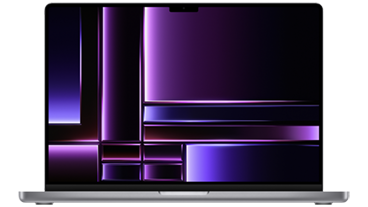
16-inch MacBook Pro (2023)
Save on every configuration with exclusive promo code deals.
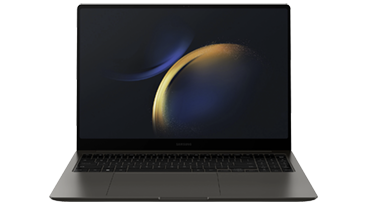
Samsung Galaxy Book 3 Ultra
Get a free storage upgrade on the Galaxy Book 3 Ultra for a limited time.
The Book 3 is lighter at 3.95 pounds than the MacBook Pro at 4.7 pounds, or 4.8 pounds with an M2 Max chip. In size, the Book 3 Ultra is thinner and longer at 0.65 by 13.99 by 9.86 inches, compared to the MacBook Pro at 0.66 by 14.01 by 9.77 inches.
Each notebook sports a 16-inch display that offers plenty of real estate for apps, games, browser windows, and more. However, the Galaxy Book 3 Ultra might be more appropriate if you prefer a lighter notebook to stick in a bag.
Galaxy Book 3 Ultra vs MacBook Pro 16-inch – Display
The display on the Galaxy Book 3 Ultra is AMOLED with a resolution of 2,880 by 1,800 pixels. Samsung doesn’t list the pixel density of its notebook, but a website that calculate such density provides 212 pixels-per-inch based on the display size and resolution.
The MacBook Pro has a pixel density of 254 pixels per inch with a resolution of 3,456 by 2,234. The increased density provides users with more details for onscreen content as well as sharper images and videos.
Apple’s current design iteration changed the display design on newer MacBook Pros by adding a notch, though it doesn’t house a Face ID system like newer iPhones. It stands out from the menu bar but it blends into the rest of the display, such as when users open full-screen apps.
The MacBook Pro uses Liquid Retina XDR technology in the display, which lets professionals use preset reference modes that set the color space, white point, gamma, and brightness on display. Professionals can also create custom reference modes.
For backlighting, the MacBook Pro uses Mini LED technology in the display that offers high contrast ratios and fast response times when displaying content. In contrast, AMOLED technology doesn’t need backlighting because each pixel acts as a light source.
The backlighting on the MacBook Pro provides brightness at 1,000 nits sustained full-screen and 1,600 nits at peak for HDR content. SDR brightness tops at 500 nits and contrast ratios reach 1,000,000:1. The P3 wide color gamut supports one billion colors for smoother gradients.
The Book 3 offers 400 nits of brightness for SDR content and 500 nits for HDR content. Like the MacBook Pro, it supports the DCI-P3 color gamut for approximately one billion colors.
Each notebook has adaptive refresh rates of up to 120Hz, which provides a smooth visual experience for games, videos, or even just scrolling through content.
According to Samsung, the Galaxy Book 3 Ultra has a DisplayHDR True Black 500 certification. The technology provides deep levels of black down to 0.0005 cd/m2 and a peak luminance of 500 cd/m2, meaning candelas per square meter.
The Book 3 display also has an SGS Eye Care Display certification for a reduction of blue light.
Apple has a software feature for blue light called Night Shift, which automatically shifts the colors of your display to warmer colors as the sun sets. Another software feature called True Tone can adjust the display’s color and intensity so that images look the same even when the lighting changes.
Galaxy Book 3 Ultra vs 16-inch MacBook Pro – Processor
The powerhouse M2 Pro chip in the MacBook Pro has a 12-core CPU and 19-core GPU. Additionally, it has a unified memory bandwidth of 200GB/s.
Users can upgrade to an M2 Max chip with a 12-core CPU and up to a 38-core GPU. It also has 400GB/s of unified memory bandwidth and supports up to 96GB of unified memory.
The M2 Pro and M2 Max chips each offer eight performance and four efficiency cores. The M2 Pro has a Media Engine for encoding and decoding video, and another one for ProRes. The M2 Max has two Media Engines for ProRes and video encoding and decoding.
Both chips also have a 16-core Neural Engine capable of 15.8 trillion operations per second for plowing through machine learning tasks.
On the Intel side, the Core i7 and Core i9 chips each offer two multi-format codec engines for hardware encoding and decoding.
On the Galaxy Book3 Ultra, users can add either a 13th-generation Intel Core i7 or Intel Core i9 processor. The Core i7-13700H and i9-13900H have eight cores for efficiency and six cores for performance, and each has a maximum memory size of 64GB.
The Core i7 chip provides Intel Turbo Boost technology of 5.00Ghz, and the Core i9 bumps that up to 5.40GHz. Turbo Boost can provide increased performance on the cores by increasing the clock frequency of the CPU.
Geekbench doesn’t yet have benchmarks for the 2023 MacBook Pro with an M2 Pro or M2 Max chip. However, a 2023 Mac mini with a 12-core M2 Pro chip has a single-core score of 1,915 and 14,507 in the multi-core score.
Although the score was obtained using a Mac mini, a MacBook Pro with the same chip would perform closely.
Initial benchmarks for the M2 Max chip appeared in December, although it’s not clear which Mac it is. But the results show a score of 2,027 for a single core and 14,888 for multi-core performance.
It’s not clear what model Geekbench lists for the Intel Core i9-13900H, but the Samsung device shows a score of 1,614 for single-core performance and 11,657 in multi-core performance. Unfortunately, there are no Samsung devices listed so far on Geekbench with an Intel Core i7-13700H.
The Apple chips handily outclass the Intel chip in each score, but as with all benchmarks, they don’t necessarily reflect performance in real-world usage.
Galaxy Book 3 Ultra vs MacBook Pro 16-inch – Graphics
Apple doesn’t include discrete GPUs in its M-series of custom silicon chips. Instead, the M2 Pro chip offers a 19-core GPU, and the M2 Max supports either a 30-core GPU or one with 38 cores.
Metal benchmarks for the M2 Pro and M2 Max are 52,691 and 86,805, respectively. On the Galaxy Book 3 Ultra, users can choose an NVIDIA RTX GeForce 4050 or an NVIDIA RTX GeForce 4070, but most benchmarking platforms don’t yet have scores for these new products.
The MacBook Pro supports various external displays over different ports and configurations. For example, the M2 Pro can drive up to two monitors with up to 6K resolution at 60Hz over Thunderbolt.
Or, it can support one monitor up to 6K at 60Hz over Thunderbolt and one with up to 4K at 144Hz over HDMI. A third option is one external display with 8K at 60Hz over Thunderbolt or one external display at 4K resolution at 240Hz over HDMI.
The M2 Max also supports external displays in different configurations. One setup offers up to three displays with 6K at 60Hz over Thunderbolt and one screen up to 4K at 144Hz over HDMI.
A second configuration involves three displays — two at 6K resolution at 60Hz over Thunderbolt, and one up to 8K at 60Hz or 4K at 240Hz over HDMI.
The Intel Core i7 and Core i9 chips can each handle four external displays, though neither Intel nor Samsung dive into the details of resolution like Apple. However, the Galaxy Book3 can connect to certain tablets for a second screen, including the Galaxy Tab S7, S7+, S7 FE, S8, S8+, and S8 Ultra.
Apple has a similar technology called Sidecar that lets users use an iPad as an external monitor for their Mac. It requires macOS Catalina or later and iPadOS 13 or later.
Galaxy Book 3 Ultra vs MacBook Pro 16-inch – Camera
Each notebook sports a 1080p webcam for crisp, clear video calls, conferencing, and more. The MacBook Pro camera offers an advanced image signal processor with computational video support.
The MacBook Pro running macOS Ventura has a unique feature called Continuity Camera. If users aren’t satisfied with the webcam, they can use their iOS 16 or later iPhone as a webcam instead.
Samsung includes a feature called Studio Mode in its webcam, and it offers a wide-angle view with beauty effects to touch up a person’s appearance, as well as corrections to lighting and eye contact.
Galaxy Book 3 Ultra vs MacBook Pro 16-inch – Storage, Connectivity, Power
The MacBook Pro has a few advantages over the Galaxy Book 3 Ultra here. First, in storage, it offers configurations that include 512GB, 1TB, 2TB, 4TB, and 8TB solid-state drives, compared to the Book 3 Ultra, that only has 512GB and 1TB storage options.
The ports on each model are also different, with the Galaxy Book 3 Ultra offering one HDMI 2.0, two Thunderbolt 4 ports, one USB-A 3.2, a Micro SD slot, and a 3.5mm audio jack for a headphone-out and microphone-in combination.
Meanwhile, Apple doesn’t bother with USB-A ports on Mac notebooks anymore. Instead, the MacBook Pro offers three Thunderbolt 4 ports, an HDMI 2.1 port, and a slot for SDXC cards. An SDXC, or Secure Digital Extended Capacity card, provides greater storage capacity than regular SD cards at up to 2TB.
For connectivity, each notebook offers Wi-Fi 6E (802.11ax), but while the Book 3 Ultra uses Bluetooth 5.1, the MacBook Pro has Bluetooth 5.3 support. Bluetooth 5.3 provides less connection interference and better quality, depending on the bandwidth required.
Samsung doesn’t break out the battery life for the Book 3 Ultra, but it does list it as having a 4,757mAh capacity. On the Apple side, the 16-inch MacBook Pro provides up to 15 hours of wireless web browsing and up to 22 hours of Apple TV app movie playback, though it can vary by use and configuration.
Apple typically doesn’t list specific battery capacities for its products, though its page for technical specifications mentions that the 2023 16-inch MacBook Pro battery offers 100 watt-hours. The company’s testing for the battery life involved playing HD 1080p content in the Apple TV app with the display brightness set to eight clicks from the bottom.
Galaxy Book 3 Ultra vs Apple MacBook Pro 16-inch – Other features
For audio, the MacBook Pro uses a trio of “studio-quality” mics in an array with a high signal-to-noise ratio and directional beamforming. It also has a high-fidelity six-speaker sound system with force-canceling woofers.
The Galaxy Book 3 Ultra has speakers from AKG Acoustics — two woofers and two tweeters. Both notebooks have support for Dolby Atmos, which is a surround-sound technology. Samsung also claims its two microphones as “studio-quality.”
Each notebook offers fingerprint readers for security, found on the power button on both models. Again, Samsung doesn’t break out specific data, but Apple’s Touch ID technology offers AES-256 encryption with a false positive value of 1 in 50,000.
Galaxy Book 3 Ultra vs MacBook Pro 16-inch – Pricing
The Galaxy Book 3 Ultra starts at $2,199 for the base configuration model with an Intel Core i7, 16GB of memory, 512GB of storage, and an NVIDIA GeForce RTX 4050 graphics card. Choosing 1TB of storage bumps up the price, but Samsung offers that storage capacity at a lower price for a limited time, which would normally cost an extra $200.
Meanwhile, choosing an Intel Core i9 processor starts at $2,799, and this variant also provides users with a choice between an RTX 4070 GPU with 32GB of memory and 512GB of storage or one with 1TB of storage. Samsung also offers this configuration’s 1TB storage option at a limited $200 discount.
The 16-inch MacBook Pro starts at $2,499 with a 12-core M2 Pro chip with a 19-core GPU, 16GB of memory, and 512GB of storage. Other chip options include a 12-core M2 Max with a 30-core GPU for $200 or a 38-core GPU for $400 extra.
Choosing the M2 Pro offers an upgrade to 32GB of memory for an extra $400, while the 30-core M2 Max comes standard with 32GB of memory and a $400 upgrade to 64GB of memory. The highest-tier M2 Max with a 38-core GPU unlocks a similar $400 upgrade to 64GB of memory or 96GB of memory, adding $800.
All processor variants on the MacBook Pro have the same storage upgrades, costing $200 for 1TB, $600 for 2TB, $1,200 for 4TB, and capping out at 8TB for $2,400. The highest-tier version of the 16-inch MacBook Pro with all of the upgrades costs $6,499, while the most expensive Book 3 Ultra model is $2,999 once the storage and GPU discount ends.
Galaxy Book 3 Ultra vs MacBook Pro 16-inch – Which to buy?
Regular people and power users who need to run Windows on a capable machine will find that in the Galaxy Book 3 Ultra. The processors and GPU can handle most everyday tasks such as web browsing and productivity, and Windows has historically been a more popular gaming platform than macOS.
However, those who require a lot of storage, memory, and power to do their work, such as developers, photographers, musicians, and others, would benefit more from the MacBook Pro. Depending on the chip configuration, it can reach up to 8TB of storage and up to 96GB of memory.
The graphics capability on the MacBook Pro is also impressive for being an integrated GPU on the system-on-a-chip. In raw numbers, the M2 Max is just ahead of the NVIDIA chips that are discrete GPUs, though the two devices might end up running at a similar graphics level in real-world usage.
The MacBook Pro provides desktop-level performance in a notebook form factor, so it’s an ideal device for people who need high performance whether they’re traveling or at home.
However, in some settings, Windows is required to run specific apps, and people who need Microsoft’s operating system will find plenty of power in the Galaxy Book 3 Ultra.
The basic configuration of the Galaxy Book 3 Ultra is cheaper than the MacBook Pro at the same default tier, but not by much. Spending an extra $300 to get the MacBook Pro is worth it for what it provides at that price point.
Galaxy Book 3 Ultra vs MacBook Pro – Where to buy
Apple’s MacBook Pro 16-inch is eligible for exclusive savings knocking up to $300 off every model with promo code APINSIDER at Apple Authorized Reseller Adorama.
The savings can easily be accessed in our MacBook Pro 16-inch Price Guide, which is updated throughout the day to help you score the best MacBook Pro deal on the model of your choosing.
Those that are ready to order Samsung’s laptop based on the results of the MacBook Pro vs Samsung Galaxy Book 3 Ultra showdown can pick one up for as low as $1,899.99 from Samsung directly.


